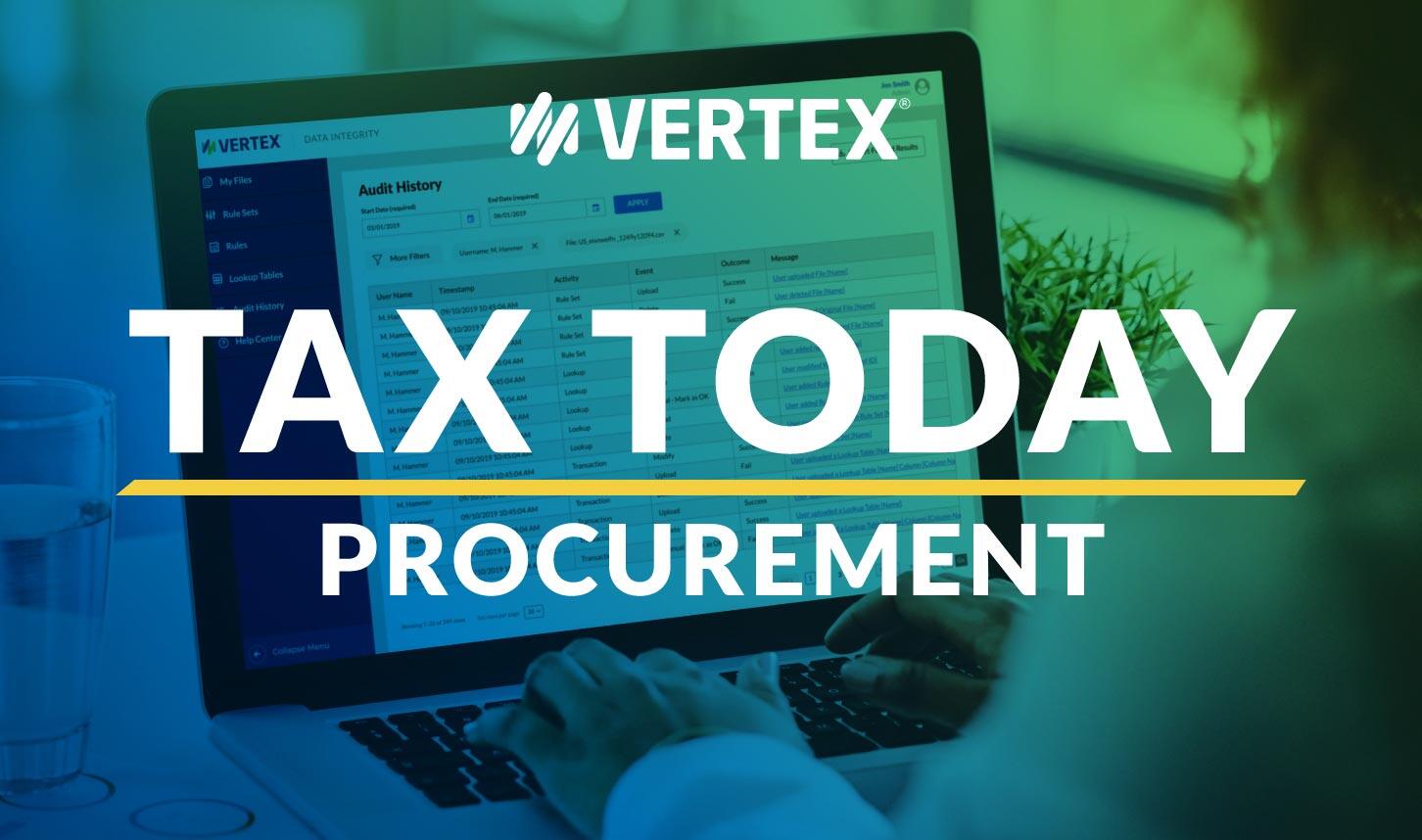MS. SCHWABENBAUER: Hi, I’m Kristin Schwabenbauer. Welcome to Tax Today, a Vertex podcast series. On today’s episode we’ll be exploring consumer use tax audits, pain points, and how to address them. Our guest today is Larry Mellon, Vertex’s tax manager. Larry has over 25 years of experience in tax compliance. He has worked to improve efficiency and timely compliance in most tax matters. He’s experienced in sales and use tax, (Inaudible 00:28) tax, property and state income taxes. Prior to joining Vertex, Larry worked in several industries including heavy manufacturing and retail. So, Larry, thank you for joining us.
MR. MELLON: Thank you for having me. I appreciate it.
MS. SCHWABENBAUER: So, let’s jump into it. I know you’ve got a ton of experience being -- you know, and you’re Vertex’s tax manager. So, talk to us and our audience. We know there are a lot of pain points around, you know, consumer use tax out of audits. And we want to take some time to discuss them, you know, during this episode. Do you feel -- in your experience, do you feel tax managers are taken off guard when auditors want to look at, you know, consumer use tax in addition to sales tax?
MR. MELLON: Yes. I do feel as if sometimes tax managers are taken off guard. As most tax managers feel as if an auditor from a jurisdiction is coming into evaluate and review their sales tax, they often lose sight of the purchases that they’re making from their suppliers and vendors to ensure that there is accurate tax that’s being put on those invoices. And often when an auditor comes in, they’re looking a full sales and use audit. And tax managers sometimes forget to look at that and recognize the potential exposure and risk with that.
MS. SCHWABENBAUER: Yeah. I can see how that could happen pretty easily. And I think it’s a really important point. So, we know invoices can have incorrect sales tax. I mean, that’s kind of a given. But why is this, what processes should you have in place to ensure, you know, accuracy with the invoices that you’re actually paying out to, you know, as a company for your purchases?
MR. MELLON: Yes, I think that often tax managers do not look at the use tax side when being audited by a jurisdiction. They don’t recognize the tax implications of not having correct sales tax on the invoices from suppliers or vendors. Often what happens is those suppliers or vendors charge the sales tax rate for where they are located, versus where the product and services are being shipped or performed. So, a tax manager has to understand the tax rate that would be on the invoice coming from their supplier.
If a vendor was using a tax engine, they would have the appropriate sales tax on their invoice for where the product is being shipped or services performed. A tax engine, like Vertex’s, could help make sure that that correct tax rate are on those invoices. On the flip side, we should make sure that the customer is using the Vertex consumer use tax software to be able to validate that the appropriate sales taxes on the invoice that comes in from that supplier and vendor.
MS. SCHWABENBAUER: Okay. Great. Yeah. I think there’s a lot of different points there that you have. And I think in some of our conversations before we’ve talked about how auditors make you prove it out. Prove out your collecting or you’re paying the right sales or consumer use tax in those consumer use tax audits. And I know you’ve had some experience with that. Can you talk to me about, you know, what that looks like of that process of proving it out? And what those different data points might be?
MR. MELLON: So, a jurisdictional auditor is going to come in and request to see invoices on purchases that were made. They could be basically looking at your general ledger accounts and picking specific accounts that they want to see. And depending on the test period, the time that they want to look at it. They may take a particular are and ask to see all the invoices that represent that period of time. And then, you have to provide those to them.
And if sales tax is on those invoices it should not be an issue for the jurisdictional audit. If there was not sales tax on that invoice, then you’d have to be able to go back and prove that you determined that that product or service was taxable. And that you then remitted use tax to the appropriate taxing jurisdiction.
So, you would have -- each month you would be including use tax on a monthly basis with your compliance on the tax that was not paid or not invoiced by your suppliers. That you, in turn, then self-assessed and paid it jurisdiction. So, you would have to prove those documents to the state taxing jurisdiction what you have paid for those invoices.
MS. SCHWABENBAUER: Okay. Okay. That -- yeah. That collects that it seems pretty challenging, though. It seems like not an easy process at an invoice level or be, you know, when you’re getting audited, being able to have to show, you know, someone -- an auditor, you know, your paper trail, if you will. Or your data trail. So --
MR. MELLON: Right.
MS. SCHWABENBAUER: -- I know that a lot of people get burned in audits with the capital expenditure purchases, because it’s their -- you know, it’s just really difficult to address. Are there ways that you can potentially alleviate the risks? Or can you give us some examples? I know we’ve -- in the past we’ve spoken about, you know, purchasing laptops and that kind of a scenario. Can you run through that for us?
MR. MELLON: Yeah. I think that what happens is that when, you know, all -- that I’ve come across, all jurisdictional tax audits want to see 100 percent of capital purchases, just because they’re significant in dollars. I think that often tax managers and stuff, you know, fail to remember that they’re looking at that. That they’re focusing most of their time to ensure that sales taxes accurately assess on their invoices out to customers, that they lose track of these capital expenditures, which could be significant.
So again, you know, with using a consumers’ use tax software, it would be able to -- you’d be able to map that so that any capital expense that was made would then be able to calculate the accurate use tax that should be remitted to the taxing jurisdiction.
Now, depending on, you know, the size of your company and determining what policies would be in place, you know, I mean, you could spend a lot of time reviewing every capital expenditure invoice by invoice, you know, to ensure that, but the software should be able to do that for you. And the burden of having to put additional man hours on to try to figure out the tax, the software should do it, you know, in place of that.
MS. SCHWABENBAUER: Yeah. I think that’s great. And that makes a lot of sense. It’s very consistent with what we’re hearing as we have, you know, interviewed other subject matter experts, like yourself. And I see the complexities here. It would be good to have, you know, a policy or procedure in place to review across the board. Because, you know, do you want your AP clerks or your AP professionals really making those decisions? And are they aware of them? I would imagine that that would be a scary thing for -- as a tax manager. But I look to you. You tell us. What are your thoughts on that?
MR. MELLON: Yeah. We -- I mean, there should be one who’s making a decision other than the tax department, accounts payable, you know, as being the primary, ‘cause they’re seeing everything. But when any person in a department of a company that has approval to approve an invoice to be paid, most times they’re not looking at the tax. They have the authority to approve that invoice. It’s up to the tax group to work with these other areas to put this software in place. To be able to do this tax mapping so that anytime they put an invoice that has been approved into the system, the decisionmaker is already there telling them how that should be or should not have been taxed.
And this way, takes that risk away from anybody doing something manual, the system would be able to generate that for them.
MS. SCHWABENBAUER: That’s great. Yeah. That -- so really what we’re talking about there is putting, you know, systems and procedures in place that allow for tax to own tax to relieve the burden off of your accounts payable folks, so they don’t have to be concerned with, you know, any issues from that standpoint. But, you know --
MR. MELLON: Right.
MS. SCHWABENBAUER: -- really allowing tax to keep -- you know, keep their hands kind of -- everywhere where tax is being charged. You know, we might not think of that --
MR. MELLON: Right.
MS. SCHWABENBAUER: -- right?
MR. MELLON: Right. And with that policy in place, you know, often, you know, you may be making a decision that something should be taxed that was not taxed by the vendor. That then opens the communication with that vendor to go back and forth to make sure that you understand what they actually are purchasing in products and services to determine are you accurate in your mapping or are you not? It also educates you on what is being purchased. And it also helps the supplier understand how the tax is implicated on the products and services they’re providing.
MS. SCHWABENBAUER: That’s great. Yeah. It is a complex issue. And I think that’s also come up at one point that you made. The fact that the relationship, you’re going back to the vendor, potentially, to say, “Hey. What are you guys doing? Why are you charging us this?” Just being able to flag that and maybe make adjustments, too.
‘Cause I would imagine you know, even after you put in a third-party tax engine, you’re gonna have to make some adjustments. You’re gonna start seeing things that pop up. Which, you know, you don’t want that to happen. You want to have everything pretty easy and smooth. But you also want to keep and maintain a good relationship with your vendor. I mean, I -- from my perspective I just say, “Oh. We’re just buying something.” But I’m sure behind the scenes there’s plenty of people at Vertex who, you know, they control those relationships, and they want to keep them good and solid. So, there’s a lot of work there that has to happen back and forth. And I imagine that the techs and AP work pretty closely together to do that. Would that be your recommendation?
MR. MELLON: Yes. They do work together. Especially when you’re, you know, initially implementing the engine that will do that information -- you know do that calculation. It’s imperative that you’re working with them, so that you know, everything is being processed. I think that for the most part, most tax managers as well probably do not have any idea the volume of invoices that come into the accounts payable department unless they’re working specifically on this use tax calculation.
You know, they know what they’re putting out on sales invoices, but it's not often they know exactly what’s coming in. They’d be surprised at the volume of invoices that go out on a daily basis that potentially are risks for them by not having accurate sales tax on those invoices.
MS. SCHWABENBAUER: Yeah. That’s hefty. That’s -- there is -- that’s hefty.
MR. MELLON: Yeah.
MS. SCHWABENBAUER: It’s a big lift for AP. They’ve got their work cut out for ‘em. But it’s a -- and it’s -- I think that’s a big deal. I mean, it is a huge -- huge risk for the company. And when, you know, gosh, if you do get audited. And I think we spoke about this before. You said -- you know, it’s not just your penalties and fines that you could, but even the assessments -- if you get hit with an assessment, you’ve gotta take it off the books. Is that -- am I remembering that correctly?
MR. MELLON: I’m not sure if we had touched base on that before, but yeah, when you do have the assessment, I mean, you know, you’re gonna certainly have that. You -- you know, did you budget for that money, you know, knowing that these audits potentially could be coming up? And I’m sure that most companies have home state assessments. And they may have generated more state and -- you know, local jurisdictions maybe creating more audits, just, you know, I mean COVID, states are looking for money. There could be a number of reasons. Something you changed in your business that would create more audits. And I think that a lot of times we’re not looking at making sure we have reserves in place to cover for those audits coming up.
MS. SCHWABENBAUER: Oh. Okay. Yeah. That’s great. That really -- that helps -- I think that gives us a real -- a bigger and a -- I would say a full picture of exactly what we’re looking at when you’re talking about, you know, consumer use tax audits and, you know, the pain around them and how to address them. So, this is great. That will do it for today’s show. Larry, thanks a million for joining us. We really appreciate it.
MR. MELLON: Great. Thank you for having me.
MS. SCHWABENBAUER: Thank you for listening. This concludes season one of Tax Today. If you want to continue the conversation with Vertex, reach out to us at vertexinc.com.
Consumer Use Tax Audits: Pain Points and Solutions
Episode 14 of Tax Today: Procurement

Episode 14 Summary
On the season one finale of Tax Today: Procurement, Larry Mellon, a tax manager at Vertex, offers tips on minimizing audit risks. As Larry will touch on, understanding your company’s obligations for sales and use tax along with keeping on top of ever-changing state tax rules and regulations is the first step.
Podcast series host, Kristin Schwabenbauer, discusses with Larry the importance of showing your data trail, implementing systems to ease the burdens on AP professionals, the risk tax manager face with incorrect invoices, and more.
Episode 1: Why is Indirect Tax in Procure-to-Pay So Critical?
Episode 2: The Differences in Tax in the Procure to Pay Process: U.S. vs. Global
Episode 3: Indirect Tax in Procurement – Landscape, Opportunities, and Challenges
Episode 4: Indirect Tax in the Procurement Landscape: Opportunities and Challenges with Global VAT
Episode 5: Industry Perspective: Integrating a Tax Engine for a Global Motor Manufacturer
Episode 6: Aligning Tax and Procurement to Streamline Business Processes
Episode 7: Key Considerations When Deploying a Tax Solution for Procurement
Episode 8: Invoicing Explained: Understanding Indirect Tax During the Procurement Process
Episode 9: Keys to a Successful Procurement Platform Implementation
Episode 10: Tax Reporting: Why Internal Audit and The Sarbanes-Oxley Act (SOX) are Essential
Episode 11: Technology Trends in P2P and Tax Automation
Episode 12: Understanding International Accounting: Global Indirect Tax and Procurement
Episode 13: Integrating Vertex with SAP Ariba: An Overview
About the Series
Still haven’t cracked the code on indirect tax and procurement? Let us help. On Tax Today, a Vertex podcast series, host Kristin Schwabenbauer holds enlightening discussions with tax, IT, and procurement specialists focused on shaping tax in the procure-to-pay process. Tune in every week for words of wisdom to help you transform tax.
Why add a tax engine for procurement?
Integrate a tax engine to improve tax accuracy and streamline procurement processes. Learn how in this video.
WATCH VIDEO
